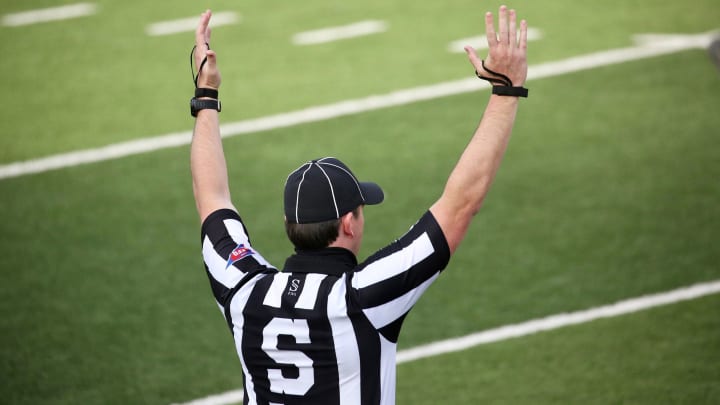College Football Officials Coordinator Aiming for 100% Vaccination Rate Among Refs

SCOTTSDALE, Ariz. — Steve Shaw took over as the national coordinator for college football officials in March 2020.
Days later, the pandemic stopped the sports world.
“COVID hit and I joke that all I did was cancel everything we had scheduled,” Shaw says during an interview while appearing this week at the Bowl Season’s annual convention in this Phoenix suburb. “Right now, we’re in that process again of determining protocols. Four weeks ago, I thought we were kind of behind it.”
More than 16 months from the first surge of COVID-19, Shaw finds himself like many within college athletics—determining how the delta variant’s spread will impact his own group, an often overshadowed entity of the college sports world: game officials.

College football’s fight to encourage vaccination isn’t only relegated to teams and administration. With similar incentives, Shaw and his national organization are strongly encouraging officials to get the shots.
Officials who refuse to get vaccinated will be responsible for paying for their weekly COVID-19 tests, Shaw says. One unnamed conference is even exploring the possibility of not agreeing to independent contractor deals with unvaccinated officials. It’s another example of college sports leaders not requiring but heavily incentivizing vaccination, which many are resisting for unfounded reasons despite proven medical data.
“Without mandating it, we’re trying to encourage every official to get vaccinated. That allows them to interact with their [officiating] crew,” says Shaw. “It’s important that our officials make their own decisions to get vaccinated. It hopefully stops or slows down the spread, but if you get it, it makes the outcome better.”
Across the country, the rates of vaccination among college football officials are positive and improving. In fact, two FBS conferences have a 100% vaccination mark among their officials, Shaw says. He declined to name them. AAC commissioner Mike Aresco tells Sports Illustrated that all but one league official is vaccinated. Conferences employ an average of 80–100 officials, many of whom work in multiple leagues.
While college football teams work to reach a standard goal of 80–85% vaccination level, Shaw says the goal for his officials is 100%. It's a lofty benchmark but one that is growing closer to reality. More and more officials are getting the shot as the delta variant creeps across the nation.
“The numbers are changing,” says Shaw, formerly the head of officials in the SEC. “There is a lot of concern and there may be some real medical reasons why you don’t get vaccinated, but I think the change and what’s happening on the ground in our country, it’s making people rethink it.”
COVID-19 cases are spiking across the nation, triggering the reinstitution of masking and testing protocols to slow the spread. The sports community is a microcosm of the nation as a whole. In the SEC, for instance, protocols are being reinstated. The league’s footprint is the least vaccinated region of the country and is among the worst in the latest surge.
The delta variant, more contagious and lethal than past strains, is responsible for at least 80% of U.S. cases. A recent study found that the delta variant had a viral load 1,000 times higher than other COVID-19 strains, says Catherine O’Neal, a Louisiana doctor and one of the SEC’s lead medical experts.
Studies have shown that the vaccine is a successful tool to battle the strand. Though those vaccinated can get infected, preliminary findings from an Israel health ministry study found the two-shot vaccine is 64% protective against infection and 93% effective in preventing severe disease and hospitalization. In the U.S., 99.5% of deaths are among the unvaccinated, according to the U.S. Centers for Disease Control and Prevention.
At several speaking engagements last month in Louisiana, O’Neal said, “If you don't choose the vaccine, you're choosing death.”
“This virus will spread through us until we are vaccinated,” she told SI in an interview two weeks ago.
Shaw hopes this fall will bring more normalcy among his game officials. He describes last season as one of the toughest ever for his crews. Officials underwent a self-administered test at home each Thursday. Results determined if they could travel Friday to the game site.
Each conference had “one to two” positives on a weekly basis, Shaw says, forcing crews to scramble to find replacements a day out. Crews also could not gather in person aside from the ride to the stadium and during the game. Post and pre-game meetings were held on Zoom with officials in their respective hotel rooms.
“As the season wore on, what keeps you going is that camaraderie and team togetherness as a crew and we didn’t get that last year,” says Shaw, who says in-game accuracy wasn’t impacted. “For the first time I can ever remember in my career, I was talking to officials and hearing them say ‘We’re ready for this year to come to an end.’ Normally, it’s ‘I can’t believe it’s over. I hate it’s over.’ ”
Shaw was hoping to lift last year’s protocols this season. Though policies are not yet determined, unvaccinated officials will not be able to meet with their crew in person without a mask, if at all, and will have to mask during games outside of a stretch of time from the snap to the end of a play. The unvaccinated are required to test weekly—and pay for it—while the vaccinated eschew testing.
Another hope for Shaw is to allow games to return to the normal coin toss process. Last year, only one captain from each team participated in the midfield toss. This year, for now, conferences are planning to allow all four captains to participate.
However, Shaw gives a warning synonymous with any pandemic.
“Things are changing quickly,” he says.
More College Football Coverage:
• SEC Expansion Creates Scheduling Conundrum
• Where Does the Rest of the Big 12 Go From Here?
• Fort Lauderdale and the Birth of a Football Program
